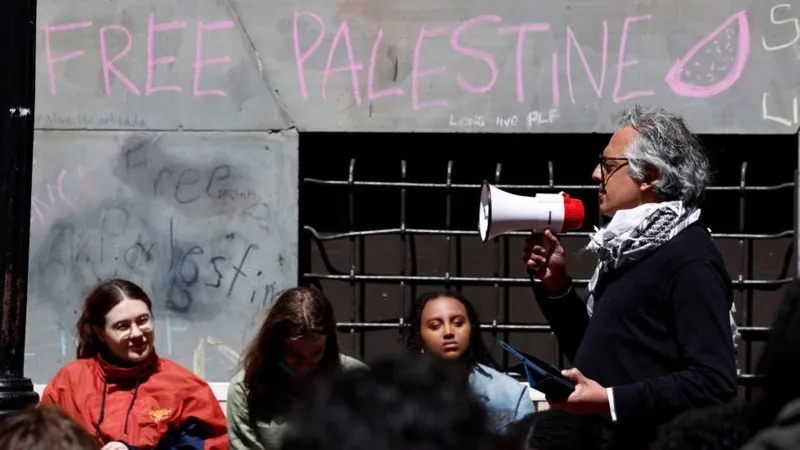- By Brandon Drenon, BBC News
Columbia University has extended remote classes at its main New York City campus for the rest of term amid tense Gaza war protests that have spread to US colleges nationwide.
The hybrid learning comes as some students have reported antisemitic harassment around Columbia’s campus.
Some 133 were arrested on Monday in protests at New York University.
Dozens of arrests were also made in rallies at Yale, while Harvard has restricted access to the campus.
Gaza war demonstrations have also cropped up at colleges in the US Midwest and on the West Coast, where one campus has been closed.
Nine students were arrested in Minneapolis on Tuesday morning as they attempted to set up a protest camp in front of a library on the University of Minnesota campus.
In New York on Tuesday, several hundred protesters were gathered near the NYU campus in Washington Square Park.
The crowd chanted “shame, shame” and protesters criticised New York city police and university administrators.
Police were called to NYU on Monday to break up demonstrations after university officials warned hundreds of protesters to leave.
University leaders accused the group of breaching school barricades and said they were behaving in a “disorderly, disruptive and antagonising” manner.
Authorities at NYU also suggested protesters without links to the university had turned up.
Dylan, an NYU student who declined to give his surname to the BBC, said NYU administrators are “trying to flip the script and say that this was a disruptive and antagonising protest.
“We were chanting. We were singing. We were drumming. If that represents violence, I don’t know on which basis NYU is reasoning.”
At Columbia, officials said on Tuesday that an ongoing protest encampment on university grounds – also in Manhattan – is in violation of the rules.
One student filed an NYPD hate crime report on Monday saying that he had been hit in the head with a rock while carrying an Israeli flag, the New York Post reported.
Shai Davidai, a Columbia University professor who has been outspoken about his support for Israel, said he was banned from campus and his ID was “deactivated”.
Columbia Students for Justice in Palestine said they “firmly reject any form of hate or bigotry” and disavowed “inflammatory individuals who do not represent us”.
Columbia University President Nemat Shafik said tensions on campus had been “exploited and amplified by individuals who are not affiliated with Columbia who have come to campus to pursue their own agendas”.
Dr Shafik last week defended her efforts to tackle antisemitism on campus as she testified to a US congressional committee.
Also last week, New York City police arrested more than 100 people amid Gaza war demonstrations on Columbia’s campus, including the daughter of Democratic congresswoman Ilhan Omar.
The campus unrest has caused a dilemma for higher education officials as they try to balance free speech rights with the need to maintain a safe and inclusive space for learning.
Harvard University has closed public access to the centre of its campus until Friday in apparent anticipation of similar student protests.
On the US West Coast, pro-Palestinian students set up “solidarity encampments” on Monday at the University of California, Berkeley, and California State Polytechnic University, Humboldt.
At Cal Poly, the campus has been closed until at least Wednesday due to the “dangerous and volatile situation”, school officials said, which included students using tents and beds to blockade one of the buildings.
A similar encampment has been set up at the University of Michigan.
Activists have been calling for universities to “divest from genocide”.
They accuse colleges of using students’ tuition money to invest in companies supporting Israel’s war in Gaza.
Israel strongly denies any suggestion that it is committing genocide in the Palestinian enclave, though the International Court of Justice has said the accusation was “plausible”.
The war began when Hamas gunmen carried out an unprecedented attack on southern Israel on 7 October, killing about 1,200 people – mostly civilians – and taking 253 others back to Gaza as hostages.
More than 34,180 people – most of them children and women – have been killed in Gaza since then, the territory’s Hamas-run health ministry says.


